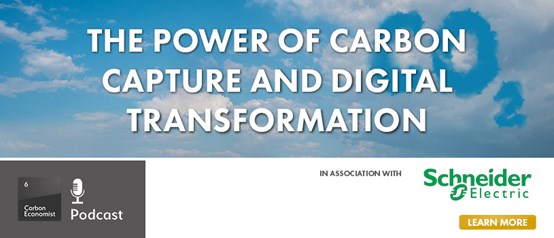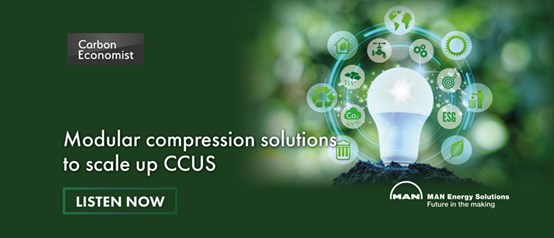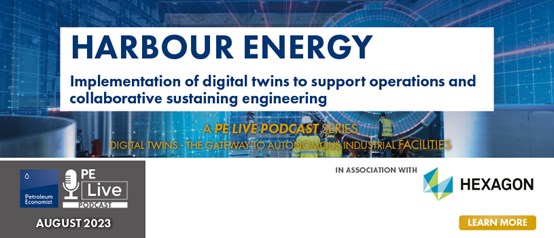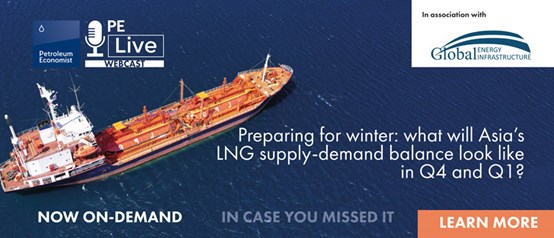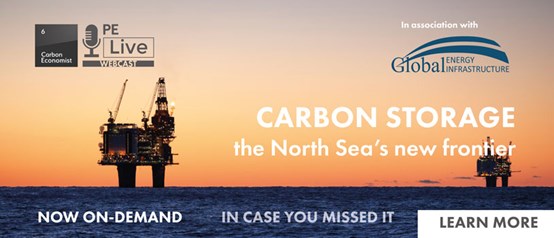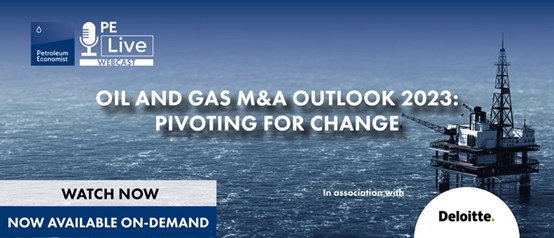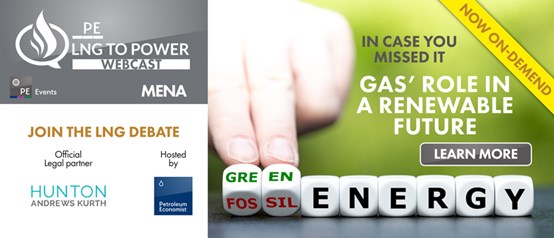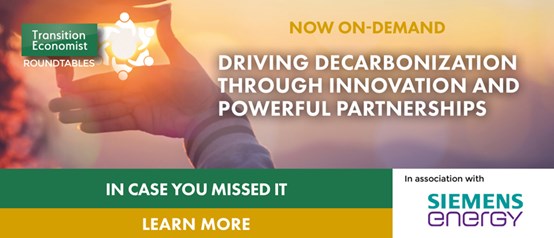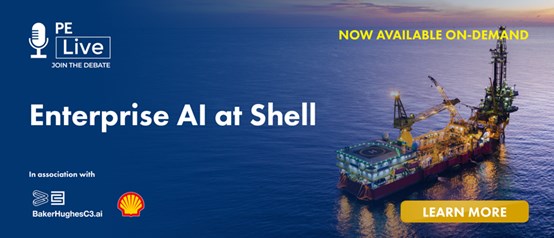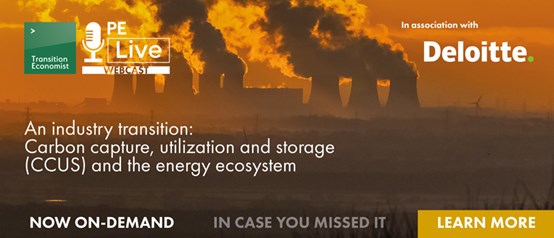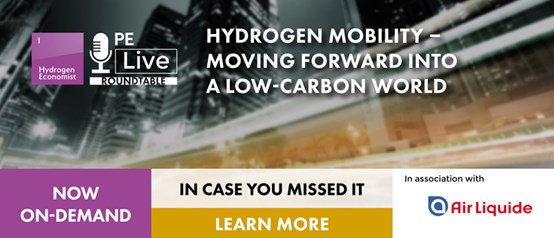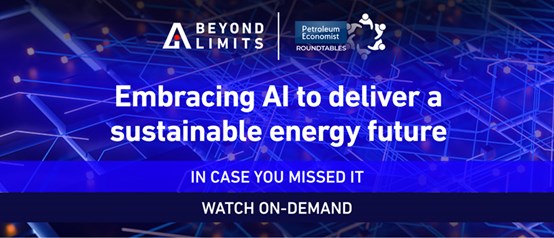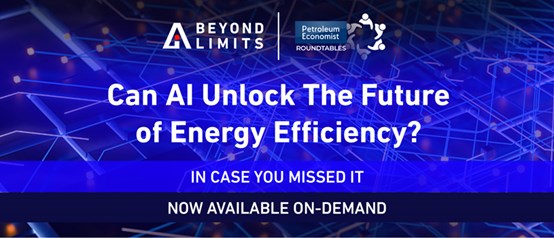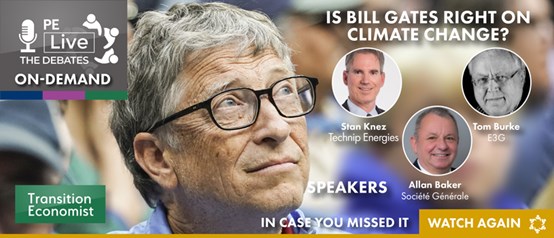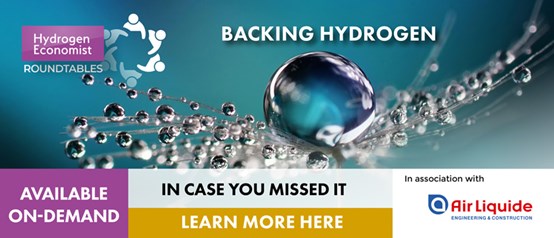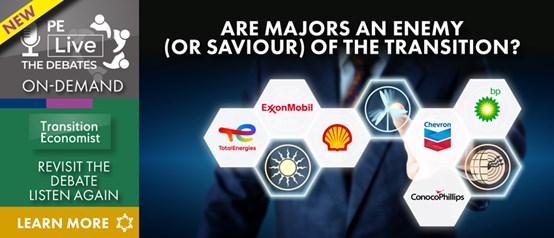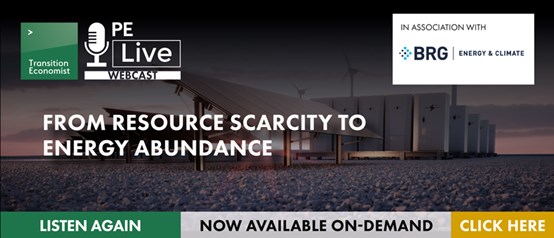Join us for this essential webcast on "Green hydrogen: challenges, experiences and effective approaches," where we delve into the forefront of green hydrogen development. This session aims to navigate through the technological challenges impeding green hydrogen production and introduce cutting-edge digital solutions poised to revolutionise the industry.
We will share enlightening case studies and best practices from various regions and industries, offering a comprehensive view of the current landscape and future prospects.
Furthermore, the webcast will highlight the latest innovations in green hydrogen production technologies and applications, paving the way for sustainable energy solutions. Don't miss this opportunity to gain invaluable insights and network with industry leaders in the green hydrogen sector.
In this episode, we dive deep into the transformative world of carbon capture and storage (CCS), a pivotal technology in the fight against climate change. Joining us are two esteemed guests from Schneider Electric: Rajesh Sharma, Global director of strategy for digital and energy transition solutions, and Ahmed Sfar, Director of business development. Together, they explore the intricacies of CCS, discussing its critical role in sustainability and decarbonisation, the impact of digitalisation and electrification, and the various types of carbon capture technologies reshaping industries. Whether you’re an industry professional, environmental advocate, or simply keen on the future of green technologies, this episode offers valuable insights into accelerating the transition towards a greener and more sustainable world.
With 35,000 professionals, across 60 countries, UK based Wood PLC are one of the world’s leading consulting and engineering companies operating across Energy and Materials markets. Whilst ranked in top three engineering firms in Oil & Gas, Refining & Petrochemicals, 22% of their $5.5 billion revenues are now generated from sustainable solutions. In this episode of the Hexagon Digital Twin podcast series, we will be examining with Wood PLC’s Mark Littleford, engineering systems and information management department manager, how they address the challenge of meeting the demands for digital twins from clients, the benefits that can be derived during the project phase, the role of standards and other aspects of how digital twins impact engineering contractors.
The deployment of CCS and CCUS globally is accelerating as it now widely acknowledged as one of the key technologies for achieving net-zero and the limiting of global warming to 1.5 degrees.
Crucial to the performance of all carbon capture systems as the industry scales up is CO2 compression. Carbon Economist is delighted to host this exclusive podcast with MAN Energy Solutions to explore its unique range of technologies in this key area.
With its unrivalled expertise and skills, MAN Energy Solutions offers modularised compression solutions for every capture technology, based on years of experience in the compression of dry and wet CO2 and over a million hours of operation in CCUS applications.
The modules are engineered to reduce delivery and installation times, with their integrally geared technology delivering optimum performance in terms of both Opex and Capex.
The story of Neom Green Hydrogen Company is truly unique. At scale, this project is the first-of-its-kind internationally, leading the world in the hydrogen revolution. Harnessing the energy of Saudi Arabia’s abundant natural resources, NGHC’s project will pave the way for the large-scale adoption of green hydrogen, while driving Saudi Vision 2030’s sustainable development goals. Paul Hickin, editor-in-chief at Hydrogen Economist spoke to David Edmondson, CEO of NGHC along with Carina Radford, a partner in White & Case’s energy, infrastructure and project finance group and Alec Johnson, a partner in White & Case’s project development and finance group about how easily the success can be replicated, what are the opportunities for green hydrogen across the Middle East and what’s next for the wider hydrogen economy.
Attorney Advertising. Prior results do not guarantee a similar outcome.
The US is on track to become the world's largest LNG exporter in 2023. Recent expansion saw the US liquefied gas sector leapfrog Australia and challenge Qatar for the top spot. Rising American volumes are driving shifts in LNG markets and have proved a vital lifeline for Europe as the continent tries to weather an energy crisis. As the US continues to expand gas production and export infrastructure, Petroleum Economist explored the future of US LNG and how the global LNG market was shifting in response.
Harbour Energy is the largest independent oil and gas company operating on the UKCS and has interests in Indonesia, Vietnam, Mexico and Norway. The company has grown through mergers and acquisition of assets from other operators resulting in a diverse portfolio of engineering systems with variable information quality. In 2021, an initiative was launched to establish a digital twin solution covering their UK operated assets to enable value creation through the use of shared and collaborative platform for engineering, operational, and project data.
In this episode of the Hexagon Digital Twin podcast series, we will be examining with Harbour Energy’s James Sitter, VP for Modifications and Project Services, and James Buchan, Technical Data Team Lead, the background for their digital twin initiative, what has been achieved to date and how the platform will now be actively used to ensure collaborative execution of sustaining engineering projects across the value chain and the business benefits expected. Plans to move beyond the digital twin towards achieving autonomy through a Smart Digital Reality will also be explored.
Europe’s policy-makers and energy industry finds its self in new territory as it pivots away from Russian gas. Old pipeline projects are being discarded as attention turns to the new infrastructure that needs to be in place to secure gas from elsewhere. The bloc is now competing with Asia for LNG, weighing up the right tactics to buy cargoes, looking at new sources of supply from US, Qatar and beyond and exploring opportunities close to home across North Africa and the East Med.
While most digital twin implementations today are focused on operations and maintenance use cases, digital twins are increasingly being deployed during the planning, design, and execution phases of the facility life cycle. In this podcast, we will discuss how the digital twin platform ensures the handover of a high-quality digital twin for operations purposes and provides benefits during the project phase.
A new dynamic has arisen in the global LNG market since Russia's invasion of Ukraine, pitting Asia's large-scale consumers against a newly gas-hungry Europe in competition for seaborne supply. Last winter was seen as crunch time, but the global market narrowly avoided gas shortages and renewed LNG price spikes thanks to the combination of a mild winter in the northern hemisphere, demand reduction measures, ample inventories and short-term ramp-ups in production. Since the winter, LNG prices have continued to moderate, which could give the impression that the time of crisis has passed. But significant risks still persist.
China, Japan and South Korea are the three top LNG importers in the world, so how are these LNG market giants preparing for next winter? Will the price-responsive, swing consumers of South Asia be squeezed out once more by the global competition for gas? Last year's volatility disrupted the LNG-to-power ambitions of emerging southeast Asian markets, particularly Vietnam, but what are the region's demand prospects now? And looking further ahead, how is Asian import capacity set to grow over the remainder of this decade?
On the supply side, how much net capacity growth has taken place and how much of that additional volume is likely to make its way to Asia? And out to 2030, how much production capacity is on pace to join the global market?
The race is on to develop the North Sea’s vast potential as a carbon store as policymakers acknowledge the key role of CCS in achieving net-zero. Multiple projects are underway as oil and gas operators and other developers jostle for position in northern Europe’s emerging carbon management sector. In this webinar, Peregrine Bush, Stuart Penson and Kevin Price explored the key projects in the North Sea and discussed the opportunities and challenges presented by this growing sector.
As the pace of digital transformation accelerates, digital twins have emerged as powerful tools for managing industrial facilities. PE Live Podcast presents a new series, "Digital Twins - the Gateway to Autonomous Industrial Facilities", in association with Hexagon. The first episode, "Realizing the business value of Digital Twins", is hosted by Karolin Schaps, a regular contributor to Petroleum Economist, in conversation with Adrian Park, Vice President Pre-Sales - EMIA, Hexagon, and Hans Kouwer, Director Industry Consulting – EMIA, Hexagon. Learn how digital twins can drive your facility towards success.
In this exclusive PE Live Webcast, "Oil and Gas M&A Outlook 2023: Pivoting for Change", in association with Deloitte, the Deloitte industry leaders will walk you through the new strategic drivers of M&A:
- Energy security emerged this year as a major driver for M&A activity, with companies increasing their focus on securing supply chains from production to shipping and transport.
- Operational excellence has become imperative in an environment where capital discipline determines success. As a result, M&A is often driven by increased consolidation to promote operational efficiencies and improvements in automation, digitalization, and productivity. The energy transition continues to be one of the driving factors (as mentioned in previous O&G M&A Outlooks), with 15% of total oil and gas M&A deal value taking place in the clean energy space in 2022.
- Companies continue to develop new partnerships with lower-carbon entities. While JVs are not directly related to M&A activity, partnerships can lead to deals down the line.
- Finally, ESG considerations also continue to influence a company’s corporate strategy, with 70% of M&A activity involving companies buying companies with higher ESG ratings in 2022.
Petroleum Economist is pleased to bring you an exclusive PE Live Webcast on East Med Rising: Israel's Offshore Bid Round and European Energy Security.
On December 13, 2022, the Israeli Ministry of Energy announced the 4th Offshore Bid Round (OBR4) for hydrocarbon exploration in the Israeli EEZ portion of the Eastern Mediterranean, Levant basin. During the past two decades multi-tcf discoveries were made in this basin, now considered to be a hotspot for gas exploration, in the vicinity of European markets. Israeli natural gas is providing most of the country’s energy production and a significant amount is being exported to neighbouring countries. The Ministry aims to expand this activity based on large, yet-to-find potential that exists offshore Israel. During this webcast, they will be discussing the details of the bid round in the context of the growing recognition of the East Med's importance in the efforts to achieve energy security for Europe and beyond.
Petroleum Economist is pleased to bring you an exclusive webcast exploring how and where will oil and gas producers deploy their cash.
Financial discipline and high energy prices have turned the tide for the global upstream industry. While the world underwent a big shift over the last few years, another realignment has been underway in the energy industry. The COVID-19 pandemic, geopolitical developments, and underinvestment in hydrocarbons have pushed energy commodity prices to record levels, causing a readjustment in energy markets, trading relationships, organizational priorities, and broader energy market narratives. Armed with record cash flows and favourable financial health, energy companies now have important decisions to make—where to invest, and how much. But evolving questions around energy security, diversification, and transition, and the uncertain trajectory of future energy prices are creating a “trilemma” of concerns for companies.
PE Live Podcast presents a new exclusive episode in association with King & Spalding. The Russian invasion of Ukraine has fundamentally changed the LNG market. This podcast focuses on why and how US exports in a radically altered LNG market and what’s changing in the current market dynamics.
The final part of the series: "Operational Technology (OT) Cybersecurity – the vital next step in digitalisation" in association with Hexagon Asset Lifecycle Intelligence. Cybersecurity plays an important role in the field of operational technology. This podcast focuses on what should be the strategy to tackle the challenges faced by critical infrastructures on a regular basis as new vulnerabilities and threats emerge.
Ahead of the in person LNG to Power Forum EMEA, Petroleum Economist hosted an exclusive webcast exploring the role of gas-to-power and LNG-to-power in the Mena region.
The energy transition and the push for net zero promise to change the energy markets as we know them. However, gas will still have an absolutely vital role for the foreseeable future, since gas-fired power plants remain the least carbon-intensive way to balance out the intermittency of renewables generation and ensure stable electricity supply. But that future usage still poses problems for gas producers and users, who must find ways to adapt to unpredictable and rapidly-fluctuating demand. Ahead of COP 27, the "LNG to Power MENA: insert title here" webcast will examine the growing interaction between the gas and renewable sectors, and the steps gas market participants can take to prepare for a future as a marginal – rather than baseload – energy source.
PE Live Podcasts presents the second episode in the podcast series: "Operational Technology (OT) Cybersecurity – the vital next step in digitalisation" in association with Hexagon Asset Lifecycle Intelligence, out now.
Transition Economist in association with Air Liquide Engineering & Construction hosted a live roundtable on 15 September 2022 to discuss carbon capture as a solution to decarbonize industries with a special focus on the US market.
The growth of CCS is gaining momentum in the US, with major oil and gas producers giving the technology high priority as they respond to pressure to decarbonize. Supportive federal policies such as the 45Q tax credit system, combined with the country’s existing network of CO2 pipelines and available storage capacity have given the US CCS sector a head-start, while the recent emergence of plans for low-carbon industrial clusters have provided new opportunities to deploy the technology across a range of sectors.
PE Live Podcasts presents a new series: "Operational Technology (OT) Cybersecurity – the vital next step in digitalisation" in association with Hexagon Asset Lifecycle Intelligence. The first episode was launched on 30 June 2022. Episodes 2 and 3 coming this autumn.
More than 130 countries have set or are developing net-zero targets but making these transitions is an immense task and everyone needs to pitch in: business, politics, and society. It starts with being transparent about climate contributions, which creates accountability and helps us make informed decisions.
The path to net zero will involve higher prices and society will have to face new paradigms with more conscious consumption. We may not be able to solve climate change as individuals, but the choices we make do matter. Carbon pricing, for example, would offer companies an incentive to incorporate climate risks into the cost of doing business. And reforming fossil fuel subsidies would allow clean energy to compete on a level playing field.
It is within this mindset that Siemens Energy announced last year that it is advancing its collaboration with B.Grimm to modernize 10 of their cogeneration plants by applying digitalization solutions for operation and maintenance, to reduce fuel consumption and production costs, and to enhance their availability and efficiency. Continuous advancement of innovative technologies is the key to accelerate energy transition and transformation.
Shell has been a pioneer in the development and deployment of digital technologies for decades. Today, they have over 100 AI applications in various stages of development and deployment across their businesses; a data lake with trillions of rows of data and machine learning based monitoring of over 10,000 pieces of equipment in upstream, downstream, manufacturing, and integrated gas. C3 AI and Baker Hughes play an integral part in enabling Shell’s deployment of enterprise AI solutions at scale with Shell’s predictive maintenance solutions, built on the BHC3 AI Application Platform, realizing value through increased reliability and reduction in cost.
CCUS is gaining traction as one of the transition’s key technologies, supported by rising carbon costs and supportive policies in some regions.
Demand for the technology is growing across multiple applications, from the abatement of refining and gas-fired generation, to blue hydrogen projects and multi-sector low-carbon industrial clusters.
What are the technical and financial challenges facing developers of these complex projects and what is the outlook for CCUS by sector and by geographical region as the transition unfolds over the coming decades?
IOC-to-IEC is a popular strategy among Europe’s integrated oil and gas producers. But that does not make it appropriate for NOCs, independents or even IOCs in other parts of the world. Some IOC investors are unconvinced if it is a valid strategy at all. Join Deloitte, OMV, MOL and SMBC in conversation with Petroleum Economist on what determines the best portfolio optimisation route for different classes of producers and in different geographies.
Global LNG demand is expected to reach 700 million tonnes by 2040, according to forecasts, as demand for natural gas increases and gains further traction in powering hard-to-electrify sectors. LNG operators are tasked with maximizing production from installed capacity while improving efficiency and reducing emissions, but face limitations with traditional optimization techniques that analyze a limited set of process variables and use lengthy procedures that do not produce timely recommendations.
Join Baker Hughes and C3 AI as well as a guest speaker from Shell to learn about the role of artificial intelligence (AI) in optimizing processes for improved production and energy efficiency in LNG operations. The webinar will feature industry and data science experts discussing the role of enterprise AI, the challenges with physics-only simulation technologies, and examples of AI-based optimization in LNG operations today. The session will also include a technical overview of BHC3 Process Optimization for LNG, an AI-based solution that helps increase production and reduce energy use in LNG processes.
Hydrogen Economist in association with Air Liquide hosted a live roundtable to examine the growing hydrogen mobility sector and what is needed as we transition into a low-carbon world. The panellists explore key opportunities and challenges facing the sector, including the subsectors of road transport and aviation, what technologies are changing the industry and what further steps are needed in terms of policy and the regulatory environment to make them cost competitive with conventional fuels. The discussion focuses on the key markets of Europe and the US/Asia.
Keeping pace with the competition and wooing increasingly ESG-conscious capital are critical realities for the oil and gas sector. Operators need to cut costs and target efficiency gains but also lower their carbon and wider environmental footprints if they want to maintain strong revenues and attract potential investors. And this has only been emphasised by the past pandemic year.
Building the hydrogen economy requires investments all along the value-chain, but each link carries its own risk. Here we will look at how to ensure that risk is optimised, and managed, in the right way by the right organisations.
Our panel of speakers discuss:
- What are typical risks in projects of this type?
- What are the risks specifics to hydrogen projects?
- How willing are governments / firms to carry this risk and how should they share it out?
Improving operational efficiencies across the entire value chain is crucial to meeting sustainability goals, maximising resource potential and staying industry competitive. And while deploying new technologies is a vital part of the process, the latest suite of AI solutions offers operators something profoundly different.
Listen again to AJ Abdallat, co-founder and CEO, Beyond Limits and a panel of industry leaders for this exclusive roundtable.
The Microsoft billionaire and philanthropist has published a comprehensive roadmap for removing 51bn t/yr of CO2e to achieve net-zero by 2050: How to Avoid a Climate Disaster: The solutions we have and the breakthroughs we need. He systematically investigates every plausible technology and strategy, employing economic analysis to the affordability of green premiums and plausible pathways for technological development. But is he right?
The UN Cop26 in November will be perhaps the most important climate conference ever held. Article 6 could finally be agreed, paving the way for international cooperation on carbon trading. With the US newly enthusiastic and China making its first climate pledge last year, the stars may be aligning for an unprecedented global agreement.
The hydrogen economy is booming across the board and activity is now moving from grand long-term plans to concrete action. What is the most viable route to producing low carbon hydrogen with competitive costs on a relatively short timescale? Large scale production projects, twinned with carbon capture solutions or renewable sources of energy including electrolysis, are planned on both sides of the Atlantic—but the industry remains at a critical stage, with support required by governments and business models yet to be proven. This roundtable, hosted by Hydrogen Economist in association with Air Liquide Engineering & Construction, will bring together stakeholders to discuss short- and medium-term opportunities as the hydrogen economy progresses.
Many oil & gas majors have embraced the energy transition but this could prove a double-edged sword for the renewables industry. Majors’ massive balance sheets and mega-project management skills mean they are ideally placed to scale up new energy systems—but they also have vested interests and are able to distort nascent markets.
To continue to grow and thrive, organisations will need to consider the work outcomes they deliver alongside the composition of their workforces. Establishing and sustaining a net-zero workforce with the right skills and capabilities will be vitally important to meet these legal, moral and environmental goals—as well as commercial objectives.
Road haulage is among the most realistic medium-term use cases for hydrogen consumption in a hard-to-abate sector. While personal vehicles are suitable for electrification (and fuel cells) the weight and size of batteries for haulage means battery-electric will perhaps never be economically viable. On the other hand, haulage would have to compete for a scarce resource with other use cases that may have superior decarbonisation benefits and/or cost advantages.
Alternative fuels—any fuel that is not derived from conventional fossil fuels—will play a key role in the energy transition as more and more countries commit to decarbonisation and net-zero targets. Transition Economist, in association with professional services firm PwC, is pleased to present an exclusive roundtable exploring the role of alternative fuels and the pathways to commercial viability.
Natural gas will play a substantial role in global power generation over the next ten years, according to any plausible transition scenario. Replacing the remaining contribution of coal in the US and Europe will provide easy wins for decarbonisation over the period, and for far longer in Asia.
The global hydrogen market is forecast to more than double by the end of the decade. This webcast, in association with professional services firm Deloitte, explored how supply and demand could develop in tandem over this period.
The energy transition is set to transform the economic fundamentals of energy production over the next 30 years. The paradigm is shifting from being dominated by finite hydrocarbon resources to virtually infinite renewable energy, which also offers extremely low marginal costs. In association with Berkeley Research Group.
That the Eastern Mediterranean has sufficient volumes of discovered and discoverable gas reserves to become a globally relevant supply centre has not been in doubt for several years. The challenge has always been how to monetise discoveries that lie in multiple jurisdictions and often in deep water, in a region that has both geographic advantages but also geopolitical challenges.
Energy transitions around Asia Pacific are as varied as the countries of the region, but several themes are emerging. Gas is set to play a major role in displacing coal, new renewable projects are emerging regularly and the potential of hydrogen is being seriously considered in the most developed economies. While there are huge differences in the pace of transitions around the region, the direction of travel is now indisputable.
Committing to the Paris Agreement is just the first step in the move to a lower-carbon future. Energy and industrial companies must soon commit, in a world of unprecedented uncertainty, to long-term strategic decisions that may have existential consequences.
Since the landmark energy reforms were introduced in late 2013, sweeping change has reverberated across Mexico’s oil and gas industry. After 75 years of tight government control, the energy sector was pried open to foreign involvement for the first time as international companies surged to participate in a series of breakthrough bidding rounds.
The International Maritime Organization has set an ambitious target to reduce the CO2 emissions of international shipping by at least 40pc by 2030 and towards 70pc by 2050. But how can the industry be decarbonised at a cost that is not unduly detrimental to global trade?
Digital technologies are rapidly transforming every aspect of oil and gas value chains. New tools are being leveraged to help drive down costs, improve efficiencies and disrupt legacy business models and strategies. Covid-19 and volatile market conditions have only accelerated the importance of laying down the digital groundwork for future value creation.
Production of low or zero-carbon hydrogen on an industrial scale needs to be built in tandem with the emerging sources of demand across the economy. The ultimate goal is to be able to create hydrogen on a cost-competitive basis with grey hydrogen, which uses a carbon-intensive methane steam reforming process and currently dominates industrial supply, as well as conventional fuels/sources for power generation.
The widespread application of hydrogen solutions will be an essential contributor to countries being able to achieve their carbon-emission reduction commitments under the Paris Agreement. Hydrogen has vast potential as a versatile fuel that can be applied to a wide variety of sectors, from heavy industry to urban settings, and is particularly useful in sectors unsuitable for electrification.
The science behind the hydrogen economy has been around for many years, but only now are the necessary real-world factors coming together to support its implementation. Is this the right time to start building a hydrogen economy?
It has certainly been an eventful year for the global economy and energy markets. Many oil and gas producers had set out plans to transition to lower carbon fuels—but did this trend accelerate or lose momentum?
This webcast looked at the positives that remain for the UKCS even during the depressed price environment but also examines the risks it poses for the MER strategy. We asked what happens to assets that have changed hands in recent years and how the M&A landscape looks for the future.
The OFSE sector is under severe pressure globally - given sharply lower oil prices, c.30pc capex cuts across the industry and continuously declining rig counts - and the challenges are particularly acute in the US shale oil sector. How should participants respond and how will the industry evolve?
The relationship between oil and gas producers and their customers is going through the biggest change in a generation. Petroleum Economist, in association with King & Spalding, hosted a webcast on how the Covid-19 pandemic and oil price crash is impacting existing contracts and the negotiation of new ones in this new era.
The second webcast of the 'PE Live' series, in association with Shearman & Sterling presented:
- The prospects for and challenges of M&A in the current swiftly evolving market
- The way forward for M&A as the post-coronavirus picture becomes clearer
- The strategy of majors and other large IOCs
- Learnings from the aftermath of previous price collapses and their relevance this time round
- Potential acquisition targets
View on demand the first PE Live webcast with Petroleum Economist and special guests.
Some key questions our expert panellists will be answering:
• Is there a scenario where a sustained production war combined with unprecedented global demand impact changes the oil market forever?
• Do Saudi Arabia and Russia have any choice but to step back, given the escalation of Covid-19’s demand impact?
• What does the future of the US shale patch look like in various supply and demand scenarios?
• How do other production centres cope in the new price environment?
• Is cheap feedstock enough to protect refined products and petchems markets from the demand shock?




